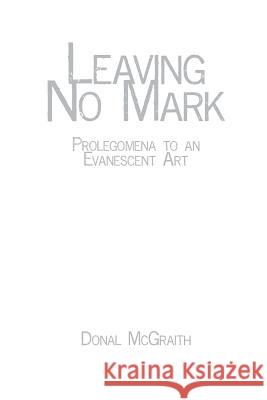Leaving No Mark: Prolegomena to an Evanescent Art » książka
Leaving No Mark: Prolegomena to an Evanescent Art
ISBN-13: 9781895166408 / Angielski / Miękka / 2015 / 104 str.
Art is fakery, a lie," begins Leaving No Mark: Prolegomena to an Evanescent Art. In this striking essay, one by one, Donal McGraith dismantles our fundamental assumptions about Western art; especially that it consists of static works of originality and rare genius. Such views of art, as a specialized activity, are the basis for its academic study and the foundation of the multi-billion dollar art market. In particular in discussing, copies, fakes and reproductions he destroys the foundation for aesthetic uniqueness. This fallacy has given rise to a "cult of personality" and a "prison house of style," whose only purpose to inflate the art market. The so-called original operates in a similar mystifying way to the religious relic, the value lies less in aesthetic quality but only in the notion, more often untrue as fakes abound, that the 'genius' has touched the object. McGraith seeks to reclaim art as the lived expression of our creativity urging that we not direct these impulses into forms that can be quickly turned into commodities. Like Navajo sand painting or the ceilidh, such endeavours would soon be lost to time. Other strategies supporting an evanescent approach are developed in a section entitled, "Anonymity, Pseudonymity & Polynymity." Donal McGraith is the author of The Wild and the Free: Shane, Rousseau, Hippies. also published by Charivari Press. He has produced a number of articles on music and art for the magazines Musicworks and Sub Rosa. His seminal essay 'Anti-Copyright and Cassette Culture' was included in Sound By Artists. McGraith's provocative views, unsettling to those who benefit from high art, are clearly on display in Leaving No Mark. "A more interesting polemic that takes a run at the history of contemporary art and underground music id Donal McGraith's 'Anti-Copyright and Cassette Culture.'" -Clive Robertson, Fuse, Winter 1991.
Art is fakery, a lie," begins Leaving No Mark: Prolegomena to an Evanescent Art. In this striking essay, one by one, Donal McGraith dismantles our fundamental assumptions about Western art; especially that it consists of static works of originality and rare genius. Such views of art, as a specialized activity, are the basis for its academic study and the foundation of the multi-billion dollar art market. In particular in discussing, copies, fakes and reproductions he destroys the foundation for aesthetic uniqueness. This fallacy has given rise to a "cult of personality" and a "prison house of style," whose only purpose to inflate the art market. The so-called original operates in a similar mystifying way to the religious relic, the value lies less in aesthetic quality but only in the notion, more often untrue as fakes abound, that the genius has touched the object. McGraith seeks to reclaim art as the lived expression of our creativity urging that we not direct these impulses into forms that can be quickly turned into commodities. Like Navajo sand painting or the ceilidh, such endeavours would soon be lost to time. Other strategies supporting an evanescent approach are developed in a section entitled, "Anonymity, Pseudonymity & Polynymity."Donal McGraith is the author of The Wild and the Free: Shane, Rousseau, Hippies. also published by Charivari Press. He has produced a number of articles on music and art for the magazines Musicworks and Sub Rosa. His seminal essay Anti-Copyright and Cassette Culture was included in Sound By Artists. McGraiths provocative views, unsettling to those who benefit from high art, are clearly on display in Leaving No Mark."A more interesting polemic that takes a run at the history of contemporary art and underground music id Donal McGraiths Anti-Copyright and Cassette Culture." -Clive Robertson, Fuse, Winter 1991.











